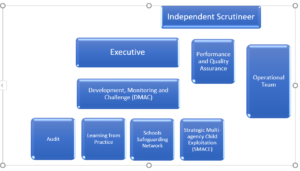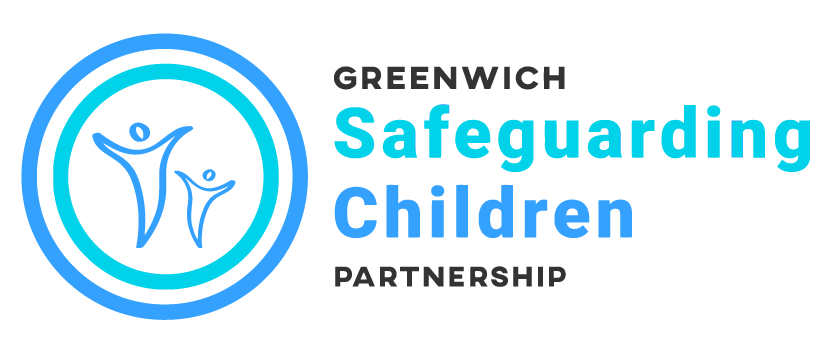Continuing Professional Development
CPD for staff registered with a professional body. Reading this newsletter and the information/learning within it counts towards your CPD and ongoing professional development. Just log what you read somewhere easy to find and include it next time you update your CPD.
GSCP Work Group Structure
Our Work Groups consist of named safeguarding representatives from across the partnership. Representatives are strategic leaders and decision makers within their organisation and include, directors, executive directors, service leads and heads of service.
The main function of the working groups is to oversee and scrutinize the safeguarding arrangements in place across the partnership, analyse learning from serious incidents and coordinate responses to these, including organising the learning and development programme.
For more details please see the working group descriptions and also read our Memorandum of Understanding.

Involving Children and Young People:

The GSCP have recently developed a proposal for the long term involvement of children and young people in our work. We want children and young people and their voices to be involved in our work as much and, as often as possible. We are working closely with the participation leaders and Work Groups to get this started. We plan for children and young people to be involved with long term work such as influencing policies and strategies discussed and agreed in our Work Groups and having input in the content and delivery of our training programme. We will involve young people in short term projects as well such as, redesigning leaflets for young people and families and making short videos for our training courses.
Focus on Child Criminal and Sexual Exploitation:

We are pleased to share that Catch 22 (a social business working to build aspiration and resilience in people and communities) has created a series of posters for professionals, parents and young people highlighting how to spot the signs of CCE/CSE & promoting positive relationships. These are high quality resources that can help refresh practice knowledge and/or facilitate work with children and their families.
There are information posters relating to the following subjects:
• Different Dangers, Same Signs
• Positive relationships break the Child Sexual Exploitation (CSE) cycle
• Child Sexual Exploitation: Think boys
• Child Criminal Exploitation: How do gangs recruit and coerce young people?
• Spotting a runaway child
• Good Practice Guidance: Return Home Interviews (RHIs) delivered remotely
• Spot the Signs: Prevent a young person going missing
• Push and Pull Factors: What causes a child to go missing?
• Keeping children safe during the school holidays
• Remote support for parents: helplines, apps and websites
• What makes a good relationship?
• Helplines, apps and websites if you need help now
Download the posters from the poster hub…https://www.catch-22.org.uk/spot-the-signs-poster-hub/
National Law & Policy Updates:
The Ministry of Justice has announced that the Positions of Trust law, which currently applies in England and Wales to roles such as teachers and social workers, will be extended as part of the Police, Crime, Sentencing and Courts Bill to protect teenagers from abuse by making it illegal for sports coaches and religious leaders to engage in sexual activity with 16 and 17-year-olds in their care. The new legislation follows the long standing ‘Close the Loophole’ campaign by the NSPCC. Separately, the Home Office has published a series of factsheets giving details of the measures contained in the Police, Crime, Sentencing and Courts Bill 2021 including a factsheet on the extension of the Positions of Trust law to include those that lead activities in sporting and religious settings.
The Metropolitan Police has launched a Pan London Child Exploitation Protocol. This replaces the Pan London CSE Protocol. It builds on the good practice documented in the 2017 CSE protocol but extends the remit to cover all forms of exploitation. This is a Police led, multi-agency document, designed to complement the All London CP procedures.
There are some major changes that are highlighted in this brief (7 slide) easy read power point created by the Police.
Pan London Protocol Police slides
Also you can view the full document here…2021 Pan London Child Exploitation Protocol
Together We Can Stop Child Sexual Abuse

This is a new Government Website, which provides advice and how to get help about sexual abuse:
https://stopabusetogether.campaign.gov.uk/
It includes the following headlines which can be clicked on, depending on who is accessing the site:
I’m under 18 and something has happened to me. What can I do?
I am 18 or over and something happened to me in the past. What can I do?
I’ve seen nude photos or videos of someone under 18 online. What can I do?
I’m under 18 and I’m worried about someone I know. What can I do?
I’m a parent or carer and I’m worried about my child. What can I do?
I am a member of the general public and I’m worried about a child. What can I do?
I’m a professional working with children. How can I keep up to date with the latest professional advice and resources?
The website ‘Everyone’s invited’ where users are invited to share accounts of sexual abuse has attracted a lot of national media attention recently. The DfE has commissioned an immediate Ofsted review into all schools (not just those named) and the police are investigating all allegations as part of their specialist response to historical abuse allegations. London Directors are overseeing the responses and arranging local action where necessary.
A dedicated NSPCC Helpline – Report Abuse in Education – has also been set up and launched Thursday 1 April. They can be contacted by phone on 0800 136 663, or by emailing help@nspcc.org.uk
Contacting the GSCP:
Email us: safeguardingchildren@royalgreenwich.gov.uk
Write to us:
1st Floor, The Woolwich Centre
35 Wellington Street
London SE18 6HQ
Follow us on Twitter: @GreenwichSCP
If any of our partners would like to contribute to the next newsletter please email us:
safeguardingchildren@royalgreenwich.gov.uk

